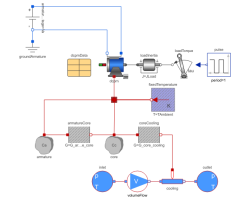DCPM_CoolingTest example: Cooling of a DCPM motor |
|
Diagram
Information
This information is part of the Modelica Standard Library maintained by the Modelica Association.
Test example: Demonstrate cooling of a DCPM motorThe motor starts at no-load speed, then load pulses are applied.
The cooling circuit consists of armature's thermal capacitance, a thermal conductance between armature and core, core's thermal capacitance and a thermal conductance between core and coolant. The coolant flow circuit consists of inlet, volume flow, a pipe connected to the core and the outlet.
Please note:
- All unused heat ports of the thermal port (i.e., without loss sources in the machine: brush, stray, friction, permanent magnet) have to be connected to a constant temperature source.
- The thermal capacitances (i.e., time constants) are unusual small to provide short simulation time!
- The coolant is a theoretical coolant with specific mass = 1 kg/m3 and cp = 1 J/kg.K.
- The thermal conductances as well as the coolant flow are parametrized such way, that:
- the total coolant's temperature rise is 10 K (over coolant inlet)
- the core's temperature rise is 27.5 K (over coolant's average temperature between inlet and outlet)
- the armature's temperature rise is 55 K (over coolant's average temperature between inlet and outlet)
- armature.T: armature temperature
- core.T: core temperature
- cooling.T: coolant temperature at outlet
Default machine parameters are used, but:
- The armature winding material is set to Copper.
- Armature reference temperature is set to 80 degC.
- Nominal armature temperature is set to 80 degC.
Parameters (16)
| Va |
Value: 100 Type: Voltage (V) Description: Actual armature voltage |
|---|---|
| Ve |
Value: 100 Type: Voltage (V) Description: Actual excitation voltage |
| w0 |
Value: Modelica.SIunits.Conversions.from_rpm(1500) Type: AngularVelocity (rad/s) Description: No-load speed |
| TLoad |
Value: 63.66 Type: Torque (N·m) Description: Nominal load torque |
| JLoad |
Value: 0.15 Type: Inertia (kg·m²) Description: Load's moment of inertia |
| TAmbient |
Value: 293.15 Type: Temperature (K) Description: Ambient temperature |
| Ca |
Value: 20 Type: HeatCapacity (J/K) Description: Armature's heat capacity |
| Cc |
Value: 50 Type: HeatCapacity (J/K) Description: Core's heat capacity |
| Losses |
Value: dcpm.Ra * dcpm.IaNominal ^ 2 Type: Power (W) Description: Nominal Losses |
| T0 |
Value: 293.15 Type: Temperature (K) Description: Reference temperature 20 degC |
| dTCoolant |
Value: 10 Type: TemperatureDifference (K) Description: Coolant's temperature rise |
| dTArmature |
Value: dcpm.TaNominal - T0 - dTCoolant / 2 Type: TemperatureDifference (K) Description: Armature's temperature rise over coolant |
| G_armature_core |
Value: 2 * Losses / dTArmature Type: ThermalConductance (W/K) Description: Heat conductance armature - core |
| G_core_cooling |
Value: 2 * Losses / dTArmature Type: ThermalConductance (W/K) Description: Heat conductance core - cooling |
| CoolantFlow |
Value: 50 Type: VolumeFlowRate (m³/s) Description: Coolant flow |
| dcpmData |
Value: Type: DcPermanentMagnetData |
Components (16)
| dcpm |
Type: DC_PermanentMagnet |
|
|---|---|---|
| armatureVoltage |
Type: ConstantVoltage |
|
| groundArmature |
Type: Ground |
|
| loadInertia |
Type: Inertia |
|
| loadTorque |
Type: Torque |
|
| pulse |
Type: Pulse |
|
| armature |
Type: HeatCapacitor |
|
| armatureCore |
Type: ThermalConductor |
|
| core |
Type: HeatCapacitor |
|
| coreCooling |
Type: ThermalConductor |
|
| inlet |
Type: Ambient |
|
| volumeFlow |
Type: VolumeFlow |
|
| cooling |
Type: Pipe |
|
| outlet |
Type: Ambient |
|
| fixedTemperature |
Type: FixedTemperature |
|
| dcpmData |
Type: DcPermanentMagnetData |
